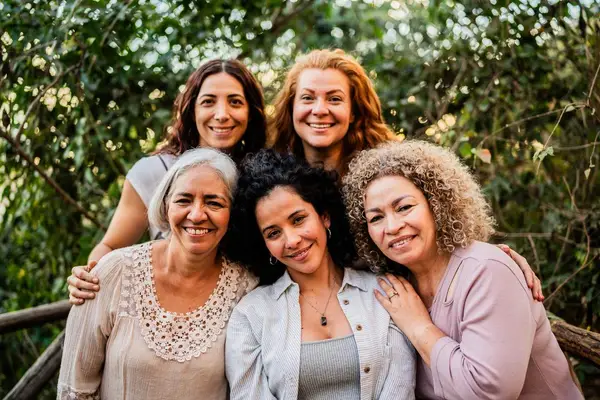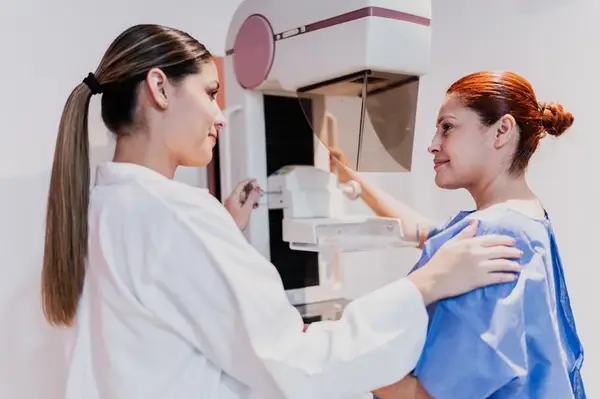It was around this time two years ago when Katie Finley was diagnosed with breast cancer and had a bilateral mastectomy. Before the surgery, doctors told her they didn’t think it was serious, and that they didn’t think she’d need chemotherapy or radiation.
However, during the surgery, Finley’s healthcare team removed a few of her lymph nodes (the first place breast cancer typically spreads) and found more cancerous cells than expected. A follow-up scan confirmed the worst: The breast cancer had metastasized, or spread, to her bones. “I had numerous lesions on my sacrum, hip and a certain number of vertebrae,” Finley said. “Looking back, I don’t think I had any symptoms that the breast cancer had spread — no pain or weakness — but I could have brushed it off as just getting older.”
For many women with breast cancer, attention to bone health is important for a variety of reasons. Maintaining healthy bone density can be difficult for women with breast cancer — including survivors — who take certain medications that can speed up and increase bone loss. For example, women with hormone-receptor-positive breast cancer are typically on hormone suppression therapy, meaning their bodies are producing little to no estrogen. Without estrogen, which is the hormone that protects bones from damage, bones become thin and weak. This can lead to osteoporosis and an increased risk for fracture, broken bones and bone pain.
Women with breast cancer cells that have spread to the bone, also known as stage 4 breast cancer, may have lesions that can cause bones to fracture and break easily. In some cases, cancer growing in the bones can press on the spinal cord, which can lead to a loss of mobility and even paralysis. In fact, research shows that 70% of women with bone metastasis will suffer a skeleton-related event (broken bones, spinal cord compression, chronic pain) within two years of diagnosis.
Dr. Brian Wojciechowski, medical advisor for breastcancer.org, said women with metastasis to the bone should talk to their healthcare team about osteoclast inhibitors — prescription drugs that can prolong bone health and reduce the frequency of bone loss. And for all women with breast cancer that are at high risk for osteoporosis, a combination of medication and lifestyle choices can help keep bones as strong as possible. According to the National Cancer Institute, resistance and weight-bearing exercises help strengthen bones, and research shows that bisphosphonates, a class of osteoporosis medication, can improve bone density in some women with breast cancer.
The benefits of diet and exercise
A diet rich in calcium and vitamin D can also aid in preventing or slowing bone loss in women with breast cancer. Good sources of calcium include dairy products and leafy greens, but inadequate amounts of the mineral from food may require that women take a calcium and/or vitamin D supplement.
Finley’s treatment plan includes a calcium supplement taken twice a day. Still, the ongoing bone pain and stiffness from both the cancer and the treatments can be very uncomfortable. Finley said it’s difficult to sit down for a normal television show or sleep in the same position for too long. “You feel like a rusty skeleton,” she said.
In the past, some doctors were more hesitant to recommend exercise for bone metastasis because of weakened bones. But a 2021 study confirmed that exercise in a supervised setting is safe for women with metastatic breast cancer, and regular exercise helps improve physical function.
Wojciechowski recommends any kind of weight-bearing activity, including running, walking or weightlifting for all women with breast cancer. “The key is to put a little bit of stress on the bones, which will stimulate them to produce more bone cells,” he said. “Anyone starting an exercise program, especially with breast cancer that has metastasized to the bone, should consult with their physician before doing so.”
Understanding your fracture risk
Women with both early and advanced stages of breast cancer have an increased risk for bone fractures, which can have a serious impact on mobility and lifestyle in the future. (Assess your 10-year fracture risk.) Eating a healthy diet and getting plenty of exercise are important steps to prevent fractures. Screening for bone health in women with breast cancer is also a high priority. The best way to gauge bone health is by having a bone density (DEXA) test, a simple scan that measures bone strength and helps detail the risk for future breaks and osteoporosis.
Important questions about bone health
For women living with breast cancer and survivors of the disease, it is equally important to consult a healthcare provider about how to make bone health and lifestyle decisions that may reduce the risk for serious skeletal complications. A few important questions to ask your physician include:
- How can I protect my bones from fractures?
- What changes can I make to my diet to help protect my bones?
- Should I have a DEXA test?
- What treatments am I on that may negatively affect bone health?
- What prescription drugs will help improve bone density?
For Finley, changes in her diet, like getting more calcium from cheese, and doing yoga have had a positive effect on her “rusty skeleton.” And more good news: Her most recent scans show improvement in her disease and that her bones are responding well to treatment. “Metastatic breast cancer pushes you closer to the finish line than you ever thought you would be, but you need to think about being an older person,” Finley said. “Your bones are older. You have to treat them with care.”
Resources:
American Bone Health Fracture Risk Calculator
Susan G. Komen Guide to Questions to Ask Your Doctor About MBC and Bone Cancer
This resource was created with support from Amgen.






